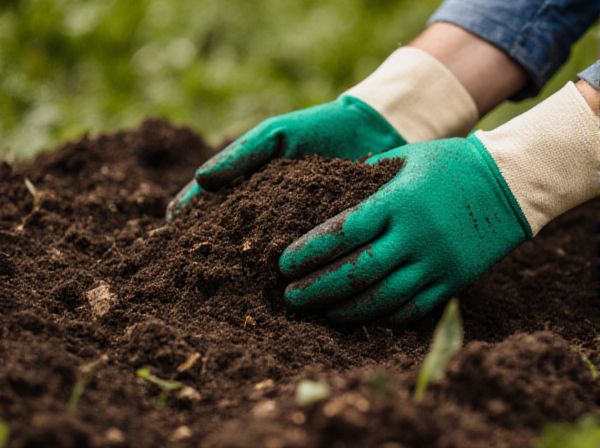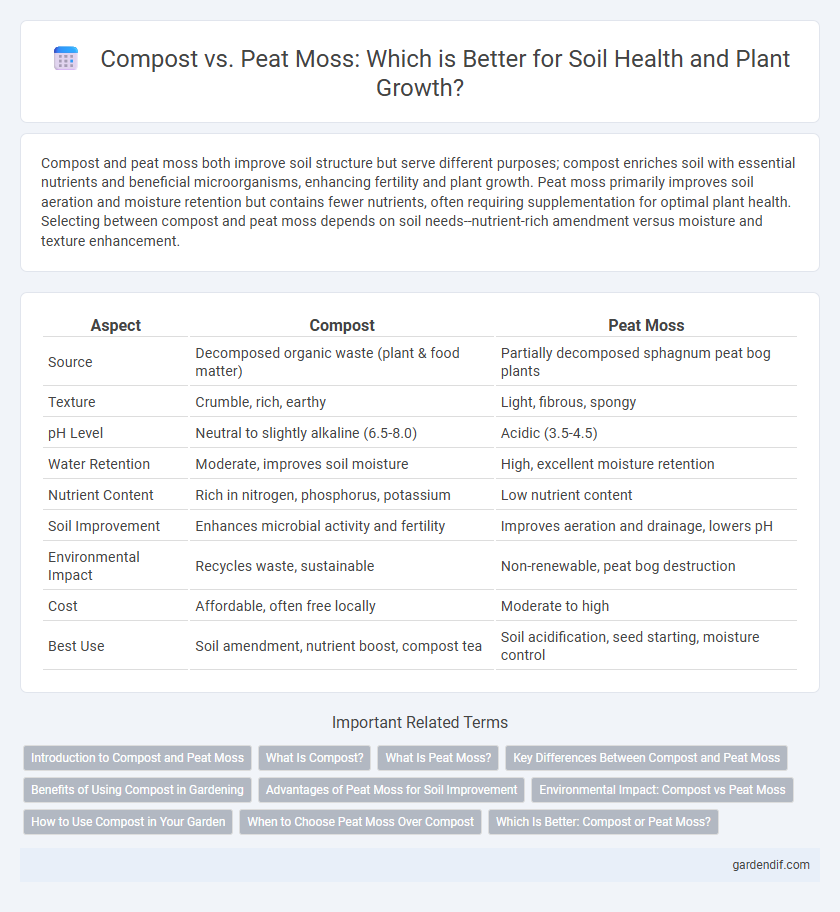
Compost vs Peat Moss Illustration
Compost and peat moss both improve soil structure but serve different purposes; compost enriches soil with essential nutrients and beneficial microorganisms, enhancing fertility and plant growth. Peat moss primarily improves soil aeration and moisture retention but contains fewer nutrients, often requiring supplementation for optimal plant health. Selecting between compost and peat moss depends on soil needs--nutrient-rich amendment versus moisture and texture enhancement.
Table of Comparison
| Aspect | Compost | Peat Moss |
|---|---|---|
| Source | Decomposed organic waste (plant & food matter) | Partially decomposed sphagnum peat bog plants |
| Texture | Crumble, rich, earthy | Light, fibrous, spongy |
| pH Level | Neutral to slightly alkaline (6.5-8.0) | Acidic (3.5-4.5) |
| Water Retention | Moderate, improves soil moisture | High, excellent moisture retention |
| Nutrient Content | Rich in nitrogen, phosphorus, potassium | Low nutrient content |
| Soil Improvement | Enhances microbial activity and fertility | Improves aeration and drainage, lowers pH |
| Environmental Impact | Recycles waste, sustainable | Non-renewable, peat bog destruction |
| Cost | Affordable, often free locally | Moderate to high |
| Best Use | Soil amendment, nutrient boost, compost tea | Soil acidification, seed starting, moisture control |
Introduction to Compost and Peat Moss
Compost is a nutrient-rich organic matter created through the controlled decomposition of plant and food waste, enhancing soil fertility and structure. Peat moss, derived from partially decayed sphagnum moss found in peat bogs, is valued for its high water retention and acidic pH, making it ideal for improving soil aeration and moisture levels. Both compost and peat moss play crucial roles in sustainable gardening and soil management, yet differ significantly in composition, environmental impact, and nutrient content.
What Is Compost?
Compost is a nutrient-rich organic material created through the natural decomposition of plant and food waste, improving soil structure and fertility. It enhances moisture retention and supports beneficial microbial activity, making it an excellent soil amendment for gardens and agricultural use. Unlike peat moss, compost replenishes essential nutrients and promotes sustainable waste recycling.
What Is Peat Moss?
Peat moss is a natural organic material harvested from sphagnum peat bogs, known for its high water retention and acidic pH. It improves soil structure by enhancing aeration and moisture-holding capacity, making it ideal for acid-loving plants. Often compared to compost, peat moss offers longer-lasting soil conditioning but is less nutrient-rich.
Key Differences Between Compost and Peat Moss
Compost is an organic matter rich in nutrients that improves soil fertility and microbial activity, while peat moss primarily enhances soil structure and water retention without providing significant nutrients. Compost decomposes rapidly, releasing essential elements like nitrogen, phosphorus, and potassium, whereas peat moss is acidic and slow to break down, making it ideal for acid-loving plants and improving soil aeration. Unlike peat moss, which is a non-renewable resource harvested from peat bogs, compost is environmentally sustainable, created from recycled organic waste.
Benefits of Using Compost in Gardening
Compost enriches soil with essential nutrients and beneficial microorganisms, improving soil structure and fertility for healthier plant growth. It enhances moisture retention and aeration, reducing the need for frequent watering and promoting strong root development. Unlike peat moss, compost is a sustainable, eco-friendly option that supports waste recycling and reduces environmental impact.
Advantages of Peat Moss for Soil Improvement
Peat moss improves soil by enhancing moisture retention and aeration, making it ideal for sandy or clay soils that struggle with water regulation. Its acidic pH benefits acid-loving plants like blueberries and azaleas while also promoting beneficial microbial activity. Lightweight and sterile, peat moss minimizes weed seeds and disease pathogens, supporting healthier plant growth.
Environmental Impact: Compost vs Peat Moss
Compost significantly reduces waste by recycling organic materials, enhancing soil fertility without depleting natural resources, while peat moss extraction leads to the destruction of sensitive peat bog ecosystems and releases stored carbon dioxide, contributing to greenhouse gas emissions. Utilizing compost supports carbon sequestration and biodiversity, whereas peat moss harvesting disrupts habitats and accelerates climate change. Emphasizing compost over peat moss aligns with sustainable soil management practices aimed at minimizing environmental impact.
How to Use Compost in Your Garden
Compost enriches garden soil by improving its texture, moisture retention, and nutrient content, making it ideal for vegetable beds and flower borders. Apply a 2-3 inch layer of compost around plants as mulch or mix it into the top 6-12 inches of soil to enhance microbial activity and root development. Unlike peat moss, compost is a sustainable, nutrient-rich amendment that supports long-term soil fertility and reduces the need for synthetic fertilizers.
When to Choose Peat Moss Over Compost
Peat moss is ideal for improving soil acidity and enhancing water retention in sandy or poor soils where compost may not provide sufficient structure. It is particularly beneficial in container gardening or seed starting due to its sterile nature and lightweight texture. Choose peat moss over compost when the goal is to create a balanced, moisture-holding medium with a low pH environment conducive to acid-loving plants.
Which Is Better: Compost or Peat Moss?
Compost is better than peat moss for soil improvement due to its rich nutrient content and ability to enhance microbial activity, which promotes plant growth and soil health. Peat moss primarily improves soil structure and moisture retention but lacks significant nutrients and is less sustainable because of environmental concerns related to peat extraction. For long-term soil fertility and eco-friendly gardening, compost is the superior choice.
Compost vs Peat Moss Infographic

 gardendif.com
gardendif.com